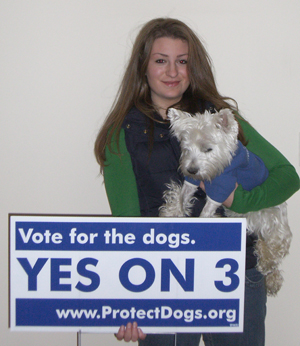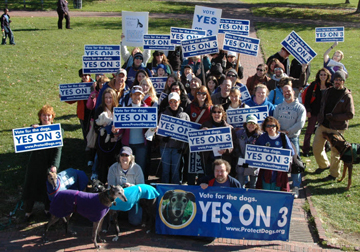Animals Have a Friend in Need with Wellesley College Senior
FOR IMMEDIATE RELEASE:
Dec. 10, 2008 |
|
 |
| Elise Traub and her dog, Britten. |
WELLESLEY, Mass. – It turns out a dog’s best friend is a woman.
Wellesley College senior Elise Traub has put countless hours of effort into eliminating greyhound racing in Massachusetts. For three years, she worked to end the sport by volunteering with the Committee to Protect Dogs. This fall Massachusetts voters approved the Greyhound Protection Act, which will end the controversial practice in 2010.
While some decried the end of jobs and entertainment associated with dog tracks, Traub and her fellow activists focused on a grim reality. In a report, "Commercial Dog Racing in Massachusetts," the Committee to Protect Dogs noted every injury reported at the state’s two dog tracks from 2002 through June 2008. Raynham Park dogs averaged seven injuries a month, Wonderland six. Most, 81 percent, were classified as "serious" or worse, including fractures, dislocation, head trauma and instant death.
Injuries typically occur from collision and collapse on the track. Just as in car racing, the animals' high speeds can result in tragic pileups.
A native of Sherborn, Mass., Traub, 22, is a lifelong animal lover.
“I started volunteering at the Metrowest Humane Society at age 9, and I started at Buddy Dog when I was 15.” She still works to help abandoned animals at the Buddy Dog Humane Society in Sudbury for 10 hours each week.
Two years ago, she expanded her commitment by working tirelessly for the Dog Protection Act, collecting signatures for a 2006 referendum that didn’t succeed. That setback only served to steel her resolve.
 |
Volunteers rally on Boston Common against Massachusetts dog racing, including Wellesley senior Elise Traub, second from left, second row from bottom. |
This year, Traub took on the job of Metrowest volunteer coordinator for the Committee to Protect Dogs, overseeing 70 to 80 people who helped collect the 120,000 signatures needed to place the Greyhound Protection Act on the ballot.
“You often have to stand outside for up to eight hours on a Saturday – a cold job in the winter in Massachusetts,” Traub said.
It’s not easy to convince people to give up their free time to collect signatures. “It’s a lot of diplomacy,” she admitted. “I learned you have to ask people in a certain way to get what you want.”
But Traub got want she wanted and then some: a total of 150,000 signatures to ensure the question would be placed before voters, where it won by a margin of 56 to 44 percent.
Traub’s devotion to animals deepened this summer when she interned at Utah’s Best Friends Animal Society, a 33,000-acre no-kill shelter, home to 2,000 dogs, cats, horses, rabbits, birds and wildlife such as minks, ravens and owls. The sanctuary has been showcased in “Dog Town,” a National Geographic television program.
“Twenty-two of Michael Vick’s pit bulls are there,” Traub said, referring to the pro football quarterback convicted of illegal dog fighting in 2007. “Some may be able to be adopted. The majority of people who suffer long-term abuse are resilient and do bounce back. That’s also the case with dogs.”
At Best Friends, one dog in particular made an impression on her. Terrified of humans, he had been found alone and chained to a fence.
“When I first started at Best Friends, he wouldn’t even come near me,” she recalled. “So I sat in his run and read to him. And I also had roast beef as a treat for him. He started to trust me and, on my very last day, I was able to pet him. I was so excited.”
Traub earned a $1,000 grant from Wellesley’s Center for Work and Service as well as a scholarship to help pursue her community service work at Best Friends. When she returned to the Wellesley College campus this fall, she jumped back into local efforts to pass the Greyhound Protection Act.
Traub was gratified to see the referendum pass, making Massachusetts the 35th state to ban dog racing. However, the work to protect animals is never-ending. She notes that the tumbling economy is overloading shelters with abandoned pets. She also points out the abuses of mass dog breeders, hoping prospective pet owners will adopt a dog from a shelter, as President-elect Barack Obama has said his family plans to do.
“If you care about animals, you wouldn’t buy one from a puppy mill,” Traub said, noting that Best Friends collected 50,000 signatures to urge Obama to adopt a shelter dog. “It’s estimated that 25 percent of shelter dogs are purebred anyway.”
When she graduates from Wellesley next June, Traub plans to work on behalf of animals for a couple of years before attending law school. Her goal is to become an “animal lawyer,” providing legal counsel for animal rights organizations.
Meanwhile, she finds an animal in need of help wherever she goes. While canvassing with the Hillary Clinton presidential campaign, she found a dog tied outside, suffering from a raging eye infection. Despite her call to local authorities, which investigated the situation, the dog’s owners would not relinquish the animal.
“Our laws don’t support animals,” she said. “People don’t take animal abuse very seriously.”
Traub wonders if people would care more if they knew the ramifications of animal abuse.
“I’m taking a psychology of law class at Wellesley and writing a paper on animal abuse and its connection to violence in the home,” she said. “You hear it over and over again: People who go on to commit violence against people often start with animals. Even if you don’t care about animals, it’s important to focus on what it leads to.”
Since 1875, Wellesley College has been a leader in providing an excellent liberal arts education for women who will make a difference in the world. Its 500-acre campus near Boston is home to 2,300 undergraduate students from all 50 states and 68 countries.
###
|

